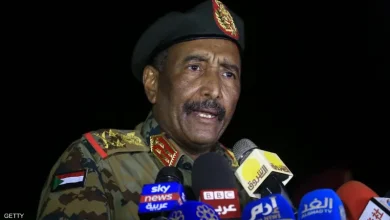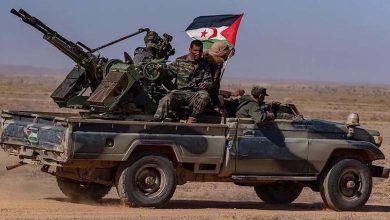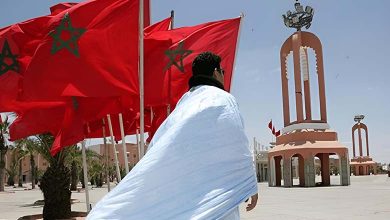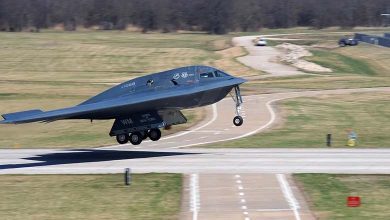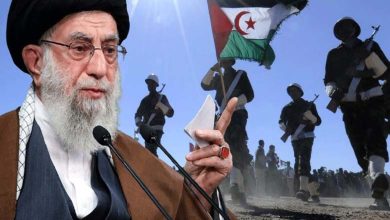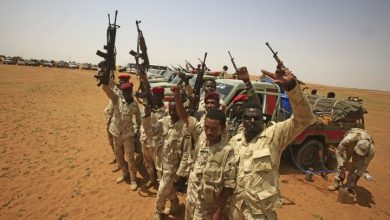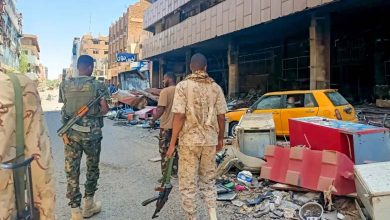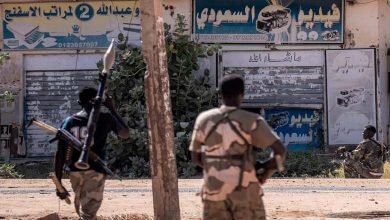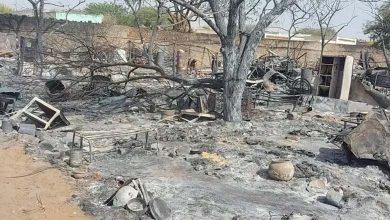Sudanese Army Rejects Any Foreign Mediation to Stop the War

Sudanese Army Chief, Abdul Fattah al-Burhan, affirmed that “any external solution to the ongoing conflict in the country will not hold,” rendering discussions about any negotiations futile.
Observers argue that Al-Burhan‘s statements before officers and soldiers, rejecting foreign mediation, are merely statements for local consumption and should not be taken seriously. Meanwhile, others believe that Al-Burhan has rejected all previous initiatives and sees only war.
What are the real reasons behind Al-Burhan‘s rejection of all foreign mediations and initiatives to resolve the Sudanese crisis?
Firstly, Sudanese journalist and political analyst Osman Mirghani states that “General Abdul Fattah al-Burhan‘s statements rejecting foreign mediations to resolve the conflict that the country has been experiencing for more than 8 months contradict what he has done before.”
Contradictory Statements
He adds that “it is Al-Burhan himself who recently sought an initiative from the ‘IGAD’ organization, then visited the organization’s member countries and requested a summit to be held, and all these actions prove that he sought the IGAD initiative, then froze Sudan’s membership in the organization entirely.”
Mirghani continues: “There is a kind of contradiction between Al-Burhan‘s actions and his statements, but I think that such statements are usually made in military areas, where the discourse is more for those present in front of him than addressing the facts, realities, or the regional and international community.”
The political analyst emphasizes that “in his latest speech, Al-Burhan used a passionate language rejecting initiatives, reconciliation, and peaceful settlement, and not a strategic and practical discourse that can be relied upon. At the same time, there was a meeting between his deputy and the vice-commander of the ‘Rapid Support Forces‘ in Bahrain just one day before those statements.”
Negotiations in Manama
Regarding developments on the Sudanese ground after Al-Burhan‘s bellicose speech, Osman Mirghani says: “What is happening now for the first time since the outbreak of clashes between the army and the Rapid Support Forces is direct talks in Manama, under the auspices of four Arab countries as well as the United States. These talks, according to available information, have achieved tangible progress, although there are points of disagreement, and I think the path of discreet negotiations in Manama is the most likely to result in an agreement, and it is preferable that there be an internal Sudanese settlement between the political and military parties together.”
Osman Mirghani explained that “the choice of Bahrain for negotiations between the army and the Rapid Support Forces may have been agreed upon between the countries, as it was not possible to return to the platform of Jeddah, but what was required was to launch a new path, given its neutrality and its standing at an equal distance from all Sudanese parties internally, a place that everyone could accept and agree upon without sensitivities.”
The political commentator also emphasized that “the recent period has seen many quarrels between Al-Burhan and Hemeti, and the two sides have exchanged many harsh words that may not allow them to negotiate under favorable conditions to reach an agreement. Thus, I believe reaching some sort of compromise or negotiation between the deputies of the two men might be preferable and closer, then once an agreement is reached, Al-Burhan and Hemeti could sign it at the highest level.”
Balance of Power
Political commentator Osman Mirghani concluded his remarks by stating that “the balance of power on the ground has clearly shifted in favor of the army, as the army that was defending for months is the one attacking today after the intervention of the ‘Kizan’, and has managed to regain many important and governed areas that the Rapid Support Forces controlled in the capital. These developments might be what encourages Al-Burhan to speak more forcefully and attempt to raise the level of demands and conditions he brings to the peace agreement.”
War Option
On his part, Sudanese political commentator Yaqoub Al-Bashir asserts that “Abdul Fattah Al-Burhan is opposed to all initiatives, whether at the level of Arab, regional, or African states, which means that Al-Burhan‘s option today is the option of war.”
He added that “Al-Burhan‘s ambition does not rely on the reality on the ground and the imbalance of forces in favor of the ‘Rapid Support Forces‘, and the army commander also disregards the suffering of the Sudanese people caused by this cursed war.”
Al-Bashir stressed that “Al-Burhan‘s recent statements rejecting foreign mediations to resolve the crisis, made during a speech at an army camp, cannot be considered unintentional or intended for local consumption, as the option offered to Al-Burhan is the option of war.”
The political commentator explained that “all negotiations will not succeed and will eventually join the initiatives of Jeddah and the IGAD, and the evidence that this will happen is Al-Burhan‘s statements rejecting foreign mediations despite his participation in them.”



